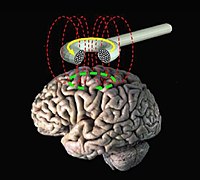
Effect of neuroanatomy on corticomotor excitability during and after transcranial magnetic stimulation and intermittent theta burst stimulation
Sign Up to like & getrecommendations! Published in 2022 at "Human Brain Mapping"
DOI: 10.1002/hbm.25968
Abstract: Individual neuroanatomy can influence motor responses to transcranial magnetic stimulation (TMS) and corticomotor excitability after intermittent theta burst stimulation (iTBS). The purpose of this study was to examine the relationship between individual neuroanatomy and both… read more here.
Keywords: corticomotor excitability; magnetic stimulation; motor; stimulation ... See more keywords

Observing back pain provoking lifting actions modulates corticomotor excitability of the observer's primary motor cortex
Sign Up to like & getrecommendations! Published in 2017 at "Neuropsychologia"
DOI: 10.1016/j.neuropsychologia.2017.05.003
Abstract: ABSTRACT Observing another person experiencing exogenously inflicted pain (e.g. by a sharp object penetrating a finger) modulates the excitability of the observer’ primary motor cortex (M1). By contrast, far less is known about the response… read more here.
Keywords: corticomotor excitability; motor; motor cortex; primary motor ... See more keywords

Connecting clinical aspects to corticomotor excitability in restless legs syndrome: a TMS study.
Sign Up to like & getrecommendations! Published in 2018 at "Sleep medicine"
DOI: 10.1016/j.sleep.2018.05.002
Abstract: We assessed corticomotor excitability in the primary motor cortex (M1) of participants with moderate-to-severe restless legs syndrome (RLS) symptoms using transcranial magnetic stimulation (TMS) in relation to the clinical and sleep aspects of the disease.… read more here.
Keywords: tms; corticomotor excitability; excitability; legs syndrome ... See more keywords

The reliability of two prospective cortical biomarkers for pain: EEG peak alpha frequency and TMS corticomotor excitability
Sign Up to like & getrecommendations! Published in 2022 at "Journal of Neuroscience Methods"
DOI: 10.1101/2022.03.06.22271797
Abstract: Many pain biomarkers fail to move from discovery to clinical application, attributed to poor reliability and feasible classifications of at-risk individuals. Preliminary evidence has shown that higher pain sensitivity is associated with slow peak alpha… read more here.
Keywords: day; corticomotor excitability; reliability; corticomotor ... See more keywords

Infraslow activity as a potential modulator of corticomotor excitability.
Sign Up to like & getrecommendations! Published in 2019 at "Journal of neurophysiology"
DOI: 10.1152/jn.00663.2018
Abstract: Fluctuations in cortical excitability are a candidate mechanism involved in the trial-to-trial variation of motor evoked potentials (MEPs) to transcranial magnetic stimulation (TMS). We explore whether infraslow EEG activity ( read more here.
Keywords: phase; mep; infraslow activity; corticomotor excitability ... See more keywords

Differential Corticomotor Excitability Responses to Hypertonic Saline-Induced Muscle Pain in Forearm and Hand Muscles
Sign Up to like & getrecommendations! Published in 2018 at "Neural Plasticity"
DOI: 10.1155/2018/7589601
Abstract: Experimental muscle pain inhibits corticomotor excitability (CE) of upper limb muscles. It is unknown if this inhibition affects overlapping muscle representations within the primary motor cortex to the same degree. This study explored CE changes… read more here.
Keywords: muscle; corticomotor excitability; hypertonic saline; muscle pain ... See more keywords

Posture-Dependent Corticomotor Excitability Differs Between the Transferred Biceps in Individuals With Tetraplegia and the Biceps of Nonimpaired Individuals
Sign Up to like & getrecommendations! Published in 2017 at "Neurorehabilitation and Neural Repair"
DOI: 10.1177/1545968316680488
Abstract: Background. Following biceps transfer to enable elbow extension in individuals with tetraplegia, motor re-education may be facilitated by greater corticomotor excitability. Arm posture modulates corticomotor excitability of the nonimpaired biceps. If arm posture also modulates… read more here.
Keywords: transferred biceps; corticomotor excitability; excitability; posture ... See more keywords

Impact of a Carbohydrate Mouth Rinse on Corticomotor Excitability after Mental Fatigue in Healthy College-Aged Subjects
Sign Up to like & getrecommendations! Published in 2021 at "Brain Sciences"
DOI: 10.3390/brainsci11080972
Abstract: Mental Fatigue (MF) has been associated with reduced physical performance but the mechanisms underlying this result are unclear. A reduction in excitability of the corticomotor system is a way mental fatigue could negatively impact physical… read more here.
Keywords: mouth rinse; corticomotor excitability; excitability; mental fatigue ... See more keywords

Modulation of corticomotor excitability in response to distal focal cooling
Sign Up to like & getrecommendations! Published in 2018 at "PeerJ"
DOI: 10.7717/peerj.6163
Abstract: Background Thermal stimulation has been proposed as a modality to facilitate motor recovery in neurological populations, such as stroke. Recently (Ansari, Remaud & Tremblay, 2018), we showed that application of cold or warm stimuli distally… read more here.
Keywords: modulation corticomotor; stimulation; corticomotor excitability; modulation ... See more keywords